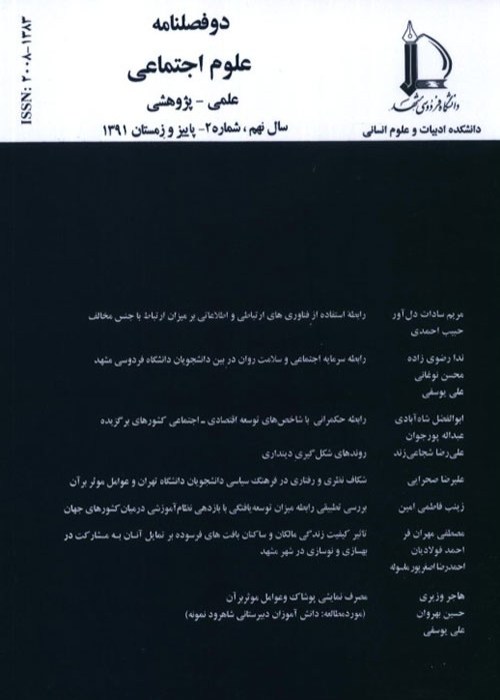Comparative Analysis of Velayat-e Faqih and Committed Democracy Theories in the Formation of Islamic Revolution Discourse
Author(s):
Abstract:
Introduction
Iran's Islamic Revolution that was initially started after the coup of 1932 (1955 AD), during the 25 years until 1979, in terms of formation, persistence, and practical and ideological leadership took a direction that major revolutions of 19th and 20th centuries fail to take. These revolutions believed that any change out of their framework was simply impossible. Therefore, they were wrong in that liberalism, socialism and nationalism were the only forces that can mobilize people to overthrow a government. However, right from the point where they took up opposition or linked to the counter-revolution, or with little tolerance they considered religion as a personal relationship between the individual and God, a big change emerged. Many calculations and consequently some new theories were challenged, and it provided the grounds for the formation of a dialogue about the third generation and postmodern revolutions (Nasri, 2009). Thus, Michel Foucault whose theory of history as the fault has raised two discourses. He believes that the Islamic Revolution is in direction of the evolution of Iranian society. He has divided the history of a revolution into pre and post revolution era (Ayuzi, 2013).As Imam Khomeini puts it, Islamic revolution is rather cultural than political (Khomeini, 1998) since it was the representation of cultural capital that provided a ground for uprising of people, thus it can be concluded that there is a strong relationship between politics and culture.
Framework: Political culture is a new terms coined after the Second World War in development literature especially in the third world countries. The first scientist who used this term in sociology was Gabriel Almond (Alem, 2008), and then its use was further increased by Sydney Verba and Lucian Pye. It follows from total viewpoints that the political culture is a function of culture and it includes attitudes, values and beliefs of people in politics. In other words, it is political culture that determines people approach and attitude toward the political system and type of relationship between people and the government. From the viewpoint of Talcott Parsons, political culture is directly associated with society orientation linked to political objectives. (Alem, 2008). There are three types of orientations in Parson's theory of political culture: cognitive, affective and value-based.
Political culture as a whole can be divided into three main categories: 1. Limited political culture in which people have an important role.
2. Consequential political culture in which people follow the government.
3. Participatory political culture in which people have a key role in the transformation and the formation of political objectives. (Ghavam, 2013).
When the political culture is not able to establish balance between three macro, micro and mid level, it loses legitimacy and grounds for revolution are formed.
Method
This study is based on theoretical methods, and its data is gained by searching in books, journals and other resources. In this study, after introducing the major components and their analysis, a comparative study of the factors will be presented.Results And Discussion
Discourse of Islamic Revolution is a result of change in the nature of the political culture of Iran during the decades of 1340 (1960s) and 1350 (1970s). In this process, the theory of Velayat-e Faqih and the theory of committed democracy have been effective. The two theories, during two decades, replaced static political culture with dynamic political culture. In other words, the discourse of Islamic Revolution was the result of rotation of limited political culture toward the culture of political participation (Dehshiri, 2002).Velayat-e Faqih and the theory of committed democracy have a lot in common. The following points are some of these commonalities.
1. Both emphasize the establishment of an Islamic state based on religious rules.
2. The constitution of both is rooted in Islam. Imam is among the most important words of the two theories.
3. Both opposed the dictatorship because basically there is no dictatorship in the sovereignty of God.
4. Both believe the imam or Islamic leader should have sufficient knowledge and moral individualities such as justice.
5. With slight differences, both approach people in the same way and apart them a similar role in the Islamic state.
6. Imam Khomeini and Shariati took the first steps for the overthrow of the Shah. They were both already prepared an alternative regime. The Islamic Republic of Iran was established on the basis of these two theories.
Conclusion and Suggestions: Velayat-e Faqih and committed democracy theories have a similar role in the formation of the Islamic Revolution discourse. Two communities had a more proactive role in the discourse of Islamic Revolution: Clergymen and intellectuals. These two theories provided the grounds for propagation of political Islam, which had a central position in the discourse of the Islamic Revolution. The Islamic Republic was established on the basis of these two theories. Therefore, recognizing the role of Shariati and his theory of committed democracy in this process can cause the spread of Islamic Revolution discourse among the young and educated, and it will guarantee the path of the Islamic Revolution for a very long time.
Keywords:
Language:
Persian
Published:
Journal of Social Sciences, Volume:13 Issue: 2, 2017
Pages:
107 to 135
magiran.com/p1683937
دانلود و مطالعه متن این مقاله با یکی از روشهای زیر امکان پذیر است:
اشتراک شخصی
با عضویت و پرداخت آنلاین حق اشتراک یکساله به مبلغ 1,390,000ريال میتوانید 70 عنوان مطلب دانلود کنید!
اشتراک سازمانی
به کتابخانه دانشگاه یا محل کار خود پیشنهاد کنید تا اشتراک سازمانی این پایگاه را برای دسترسی نامحدود همه کاربران به متن مطالب تهیه نمایند!
توجه!
- حق عضویت دریافتی صرف حمایت از نشریات عضو و نگهداری، تکمیل و توسعه مگیران میشود.
- پرداخت حق اشتراک و دانلود مقالات اجازه بازنشر آن در سایر رسانههای چاپی و دیجیتال را به کاربر نمیدهد.
In order to view content subscription is required
Personal subscription
Subscribe magiran.com for 70 € euros via PayPal and download 70 articles during a year.
Organization subscription
Please contact us to subscribe your university or library for unlimited access!



